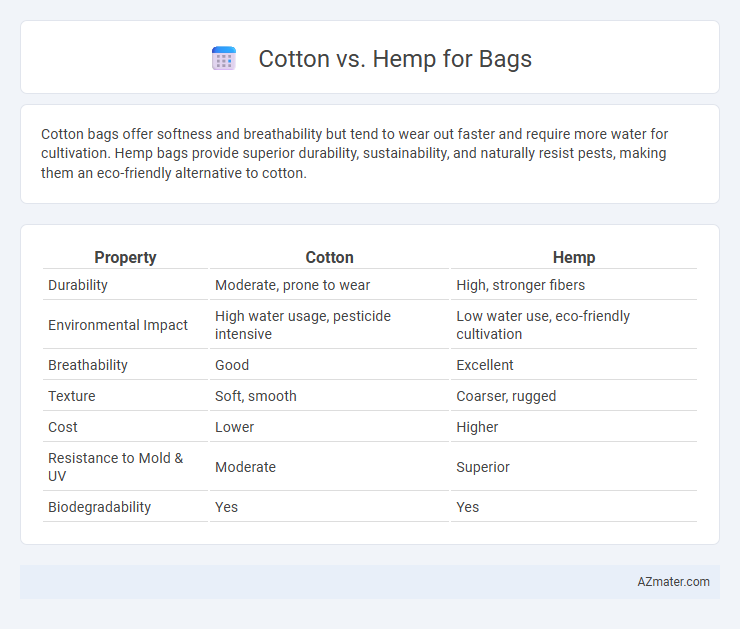Cotton bags offer softness and breathability but tend to wear out faster and require more water for cultivation. Hemp bags provide superior durability, sustainability, and naturally resist pests, making them an eco-friendly alternative to cotton.
Table of Comparison
| Property | Cotton | Hemp |
|---|---|---|
| Durability | Moderate, prone to wear | High, stronger fibers |
| Environmental Impact | High water usage, pesticide intensive | Low water use, eco-friendly cultivation |
| Breathability | Good | Excellent |
| Texture | Soft, smooth | Coarser, rugged |
| Cost | Lower | Higher |
| Resistance to Mold & UV | Moderate | Superior |
| Biodegradability | Yes | Yes |
Introduction: Cotton vs Hemp Bags
Cotton and hemp bags differ significantly in durability, environmental impact, and fiber strength. Hemp bags offer superior tensile strength and natural resistance to mold and UV light, making them more eco-friendly and long-lasting than conventional cotton bags. While cotton bags are softer and widely available, hemp's sustainable cultivation requires fewer pesticides and water, positioning it as a greener alternative for reusable bags.
Environmental Impact: Cotton and Hemp
Hemp bags have a significantly lower environmental impact than cotton bags due to hemp's rapid growth, requiring fewer pesticides, herbicides, and less water. Cotton cultivation consumes about 2,700 liters of water per kilogram, while hemp requires only around 300 liters per kilogram, making it a more sustainable choice. Hemp's ability to improve soil health and its higher yield per acre further reduces its environmental footprint compared to conventional cotton farming.
Durability and Longevity
Hemp bags outperform cotton in durability due to their stronger fibers, offering enhanced resistance to abrasion and wear over time. Hemp's natural resistance to mold, UV rays, and stretching contributes to prolonged longevity, making hemp bags ideal for heavy use and diverse environmental conditions. While cotton bags may feel softer initially, they tend to degrade faster, especially under frequent wash cycles or rough handling.
Water Usage in Cultivation
Hemp cultivation requires significantly less water compared to cotton, using approximately 50% to 70% less water per acre, making it a more sustainable choice for bag production. Cotton crops often demand about 20,000 liters of water to produce just 1 kilogram of fiber, while hemp requires only around 5,000 liters per kilogram. This drastic difference highlights hemp's superior efficiency in water usage, contributing to reduced agricultural water stress and environmental impact.
Chemical Use and Sustainability
Hemp requires significantly fewer chemical inputs than cotton, thriving with minimal pesticides and synthetic fertilizers, making it a more sustainable choice for bag production. Cotton cultivation often relies on high levels of pesticides and water consumption, contributing to environmental degradation and increased chemical runoff. Hemp's rapid growth and natural resistance reduce chemical dependency, promoting soil health and sustainable agricultural practices in textile manufacturing.
Texture and Aesthetic Comparison
Hemp bags offer a coarser, more textured feel with a natural matte finish that enhances an organic, rustic aesthetic, while cotton bags provide a softer, smoother texture with a finer weave, resulting in a sleek, polished look. Hemp's durability and earthy grain create a rugged charm favored for eco-friendly, artisanal styles, whereas cotton's versatility in dye absorption allows for vibrant colors and intricate patterns suited to fashion-forward designs. The choice between hemp and cotton bags hinges on desired tactile experience and visual appeal, balancing hemp's robust authenticity against cotton's refined softness.
Cost and Market Availability
Hemp bags typically cost more upfront than cotton bags due to the sustainable cultivation practices and durable fiber processing involved. Cotton bags dominate the market availability, benefiting from a well-established supply chain and widespread consumer familiarity. Market trends, however, show increasing demand for eco-friendly hemp bags despite their higher price, driven by growing environmental consciousness.
Biodegradability and End-of-Life
Hemp bags offer superior biodegradability compared to cotton, breaking down naturally within 3 to 6 months without leaving harmful residues. Cotton bags, although biodegradable, often require longer decomposition times and may involve chemical treatments that impact soil health during end-of-life degradation. Choosing hemp enhances environmental sustainability by reducing textile waste and promoting faster nutrient cycling in ecosystems.
Consumer Preferences and Trends
Consumers increasingly favor hemp bags over cotton due to hemp's superior durability, eco-friendliness, and lower water usage during cultivation. Market trends indicate a growing demand for sustainable and biodegradable materials, positioning hemp as a preferred choice among environmentally conscious shoppers. Cotton bags remain popular for their softness and availability but face criticism for higher environmental impacts, influencing a gradual shift towards hemp alternatives.
Which is Better: Cotton or Hemp Bags?
Hemp bags outperform cotton bags in durability, environmental impact, and biodegradability, as hemp fibers are stronger and require fewer pesticides and less water during cultivation. Cotton bags are softer but tend to wear out faster and have a higher ecological footprint due to intensive water use and chemical treatments. Choosing hemp over cotton for bags supports sustainability while ensuring longer-lasting, eco-friendly alternatives.

Infographic: Cotton vs Hemp for Bag
 azmater.com
azmater.com